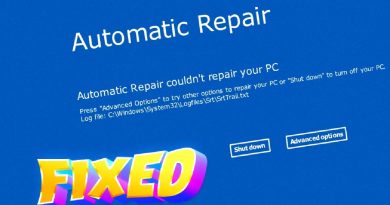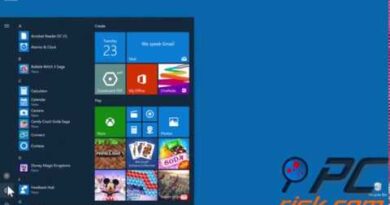Linux Won't Save Your Hardware. But You Might As Well Try…
Linux can run great on old computers, but not every PC or Mac is up to the task. Here’s why.
Website: https://trafotin.com
Donate:
✨ Patreon: https://patreon.com/trafotin
▶️ YouTube Membership: https://www.youtube.com/channel/UC5U7mHlhP6s6478wd7ZvnhA/join
Links:
▶️ YouTube: https://www.youtube.com/@Trafotin?sub_confirmation=1
📒 Odysee: https://odysee.com/@Trafotin:4?r=H3rcjs7KuCqVcwBkakJckNEZce4kD3GU
🦑 Peertube: https://spectra.video/c/trafotin
🐘 Mastodon: https://vt.social/@trafotin
𝕏 (Formerly Twitter): https://x.com/trafotin
📁 Gitlab: https://gitlab.com/trafotin
🪙 Crypto:
XMR: 84ZpcYxjfkT7uFGXgmi2jH2wyhUBMx8hGBJ3sAp478rKSShMAJHR3DhVVPSwCAskReRBPifzpA5Vu7HPpzAxHUux3SFS4bh
👇 Sauce:
https://trafotin.com/v/linux-wont-save-your-hardware/
Chapters:
0:00 Bye Security!
3:38 Far Too Limiting
8:14 “Nobody” Cares
11:45 The Dying Planet
14:18 Takeaways
how to repair windows 7




I have that exact same PC
I would argue that UEFI was a massive mistake and that everyone let it happen is proof that humanity is in decline. I would also argue that if software can't cope with older hardware it's because of lazy and/or stupid developers, which I feel my experiences in the industry has borne out as a very common thing these days and is also further proof that humanity is in decline. Now, as for whether Linux can save the older hardware, sure, and you may have to compile things from source to get them working, but once something is working you generally shouldn't ever have to update it except for security's sake. Given that, if you have a non-UEFI computer then you don't have to worry about remote exploits on your hardware. I would hope in the future that we'd have open hardware, but that's only if the decline is stopped and/or reversed.
3:50 It was outdated at the conveyor belt and still they selling it. Outdating is not about date of manufacture, its about use cases. If it is still useful – it's not outdated.
There is a misconception that mostly newcomers to Linux tend to make, which is that Linux is designed for old hardware. This is not the case, if you want to get all of its features and keep a better workflow you will need newer, more robust hardware. It does have tweaks and distros that will run on old hardware, but this is only with the idea of repurposing that old PC probably as a media center or text editor. If you really don't see any use case for an old PC, it's probably because its hardware it's just too old, no OS can save that.
No, that's not true, that's impossible! ~~ Luke Skywalker (an Linux user) when Vader (you) tells him this.
The performance problem is because wayland, I I tried wayland on an HP ProDesk 400 g1 sff with a intel core i3-4130 and 4 gb of ram, the performance in general was bad.
X11 (Xorg), on the other hand let me use that computer like it was in the launch day.
Also, Desktops Environment like KDE plasma or Gnome are too much for these computers, especially if there is no graphics card, the recomendation is lxqt or a tiling window manager with X11.
Other than that, I really liked your video, I never think about these points and I think is very important to know this information.
I completely disagree. Making a new device and properly disposing of an old one takes a lot more resources than the power the old computer will use. The old computer will still have a majority of security features of the new one if you install a modern os and modern software: ASLR, stack canaries, containerization / sandboxing… It won't have encrypted virtual memory sandbox (what Windows call VBS) but it will still be much better than running old obsolete and insecure software. The best reason to buy new hardware is to get much better performance and that few newer security features, but let's not pretend that it's for the environment.
Your remark regarding HDMI and DisplayPort is completely off. DisplayPort 1.1 that your computer has is fine outputting 1440p60 or 4k30 – same as 4 year old Intel's 10th generation Core i laptop with HDMI 1.4.
keep up good videos 👌
Also firmware is not the lowest level. Firmware, even coreboot, still contains blobs, which may not even be updated in an up-to-date firmware.
yeah, fuck proprietary Hardware…
This is sad. I wish old computers would last forever.
strangely enough , powerPC raptor blackbird systems exist , open hardware open firmware with no binary blobs etc.. , It feel quite comfortable and modern to me. 18 cores, with 22 core on back-order
Old hardware is not supposed to run new software. They are good for old software, like old games, emulation, or as a media servier like PiHole or Plex (minus the hardware transcoding).
you really should use Steam Proton for windows games, it works even for non steam games
For lowEnd/Old computers never ever install Gnome or KDE their newer version are overkill, XFCE are barely the limit for these computers, you should considering LXDE as starting point (I install it recently on Pentium 4/ 256MB RAM) old Computer and works nice, and I run it with latest version of Debian 32 bit.
BUT an Appropriately old or older Windows version configured well WILL XD! After all that's where you REALLY have hardware, software support, games, and options and custom isos galore to REALLY get the performance out of it.
Running the newest OS It can run is what will show its age and odds are you were ever only running a standard and not optimized version. And odds are it can probably run something older than what it came from if you want too
Catch is you'd have to manually patch exploitable methods (research and do that if you want it online), and use 3rd party software (possibly with outdated versions), or just keep it offline
While linux has alternatives to SOME windows has MANY MORE 3rd party alternatives.
Re: environmental issues, best part of using older laptops is the fact that if your battery is old enough, you can replace it.
При переходе на новые технологии некоторые (возможно большинство), не задумываются об оптимизации. Из-за этого возникает ситуация, вроде у тебя современная техника, а прога клешнеруких виснит из-за 1000+ прослоек которое нужно пройти данным для получения результата…
6:19 you can add a dedicated video card that still supports windows 10, it improves the graphics part of system
moo
Let's understand something about technology that a lot of people fail to understand, but a lot of enthusiasts in the vintage computing space will address; a computer should be seen as a device which functions with software of its era. Sure, Linux can drag older machines kicking and screaming into modernity, and it's fun to push the envelope with them, but if the machine struggled to run Half-Life 2 back in its day, it'll still struggle doing it today, and be good for what it was good for.
The one saving grace that stops these machines from being corpses is the fact all hardware can be given a second, alternative use. If the machine is not too old, but can't run Windows 11 and there is no interest in Linux for general computing, it can still become; a NAS, a games server, a network bridge, a streaming content ingest, or whatever else you can possibly conceive in your mind, and used beyond your wildest imagination. If it's older-than-dirt, then I guess if it runs a web browser okay, have it be used for guests or donate the hardware where the internals can be re-used for something else, such as a web kiosk. And if it's somewhere in the middle, they can still be fantastic education machines for children, a cheap way into software development for endeavouring persons in need of a new skill or a half-decent office machine in a work setting.
Ultimately, how a machine is used (or re-used) is entirely up to however much money is going to be spent for it, or however much effort you are willing to fetch ancient hardware fit for re-purposing inside an older machine for cheap. Old machines aren't no good, they're good as the day they were built. It's just a matter of where your imagination can take it, while respecting its limitations.
Quick edit about the power efficiency thing — depending on the form factor, you can replace the PSU! Maybe not for a laptop, but for TFX and ATX you can often find aftermarket supplies fit for your needs, and as mentioned in the video extenuating circumstances may make it cheaper to maintain what we have in the short-term, so that work can be done to gain new hardware in the long-term. But if the "Work" doesn't require strict time sensitivity, there's no reason to not use whatever's on-hand to get a job done.
please everyone throw away your old laptops and desktops away and use new devices for "security", itll make second hand prices much cheaper for us!
TPM is a plot to lock down computing
my fastest computer is one of these 8300 SFFs 🙂
I still have an Intel Core Duo sitting in the other room; wife used to use it; she thought it worked fine as she's never in a rush. I replaced it by giving her an 8C/16T mini-pc.
Yeah well I have an hp 4540s from 2012 with an ivy bridge i3 and I am running it with arch and hyprland. So what’s the problem
Do NOT get rid of your old PCs. How else are you going to get onto a network to see my big fat "I TOLD YOU SO!" notices?!?!?
Sure, not updated firmware can theoretically pose a security risk. But has anybody ever actually been exploited by that stuff? I think the number of times such attacks were actually performed are extremely low, and that other attack vektors are way more dangerous.
But the thing is: old hardware can't keep up with new software not because old hardware is slow, but because most new written software is slow.
My UEFI was replaced with Coreboot.
Energy efficiency only contributes to a small percentage of carbon emissions over the lifetime of a end user device. Most of the emissions come from the manufacturing process and disposal. It's still a better option for casual users.
Realistically the human cost of maintaining legacy hardware will be there regardless. It's unlikely we'll manage to end poverty globally during our lifetime. Hence legacy hardware is here to stay anyway. The only trade-off here is cost vs security. OpenGL compatibility is important to mention but won't affect the decision to buy legacy hardware
I am a nerd but i can guarantee nobody updates their UEFI, firmware version, unless something is broken
i had this discussion once on the Suse discord. i asked if it would be possible for Aeon (there immutable version) to get Legacy Bios support. they told me no and a very good reason as to why the no was given was something along the lines of "until what point do we need to support old hardware?"
I did put Puppy Linux on a old nuc. It worked surprisingly. I don't use the nuc for anything but I found it in an old box and it just seemed like the right thing to do in the moment. So I did it and afterwards I felt as if I accomplished something….I'm just not sure what. Whatever